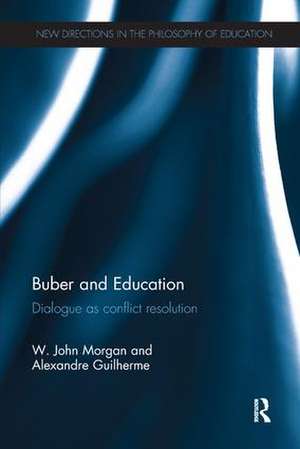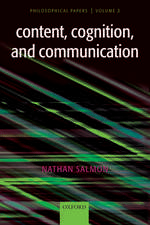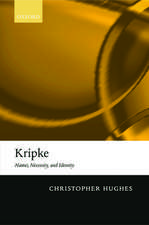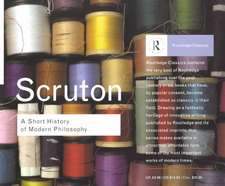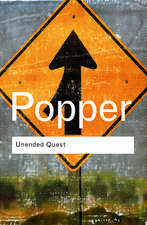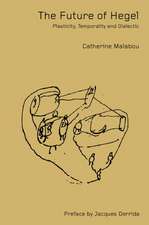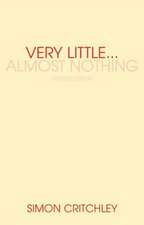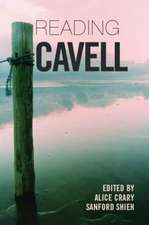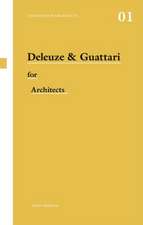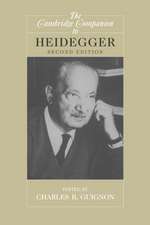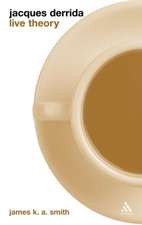Buber and Education: Dialogue as conflict resolution: New Directions in the Philosophy of Education
Autor W. John Morgan, Alexandre Guilhermeen Limba Engleză Paperback – 7 noi 2016
After Buber’s death the appreciation of his considerable legacy to the various disciplines in which he had worked became rather muted, but was never completely forgotten. There is now a renewed and growing interest in Buber’s thought, especially in his philosophy of education. This book brings together aspects of Buber’s philosophy and educational practice, and explains their significance for peace dialogue and for conflict resolution, both between individuals and communities.
Buber's philosophy of dialogue and views on education are pivotal in demonstrating the personal and social benefits of dialogical education as well as the dangers of non-dialogical education. The book will be valuable reading for academics, researchers and postgraduate students interested in Martin Buber, education, peace dialogue and conflict resolution.
| Toate formatele și edițiile | Preț | Express |
|---|---|---|
| Paperback (1) | 422.59 lei 6-8 săpt. | |
| Taylor & Francis – 7 noi 2016 | 422.59 lei 6-8 săpt. | |
| Hardback (1) | 1054.27 lei 6-8 săpt. | |
| Taylor & Francis – 27 sep 2013 | 1054.27 lei 6-8 săpt. |
Din seria New Directions in the Philosophy of Education
-
 Preț: 309.38 lei
Preț: 309.38 lei -
 Preț: 335.96 lei
Preț: 335.96 lei -
 Preț: 272.20 lei
Preț: 272.20 lei -
 Preț: 309.04 lei
Preț: 309.04 lei -
 Preț: 334.98 lei
Preț: 334.98 lei -
 Preț: 383.06 lei
Preț: 383.06 lei - 17%
 Preț: 253.67 lei
Preț: 253.67 lei - 18%
 Preț: 1002.80 lei
Preț: 1002.80 lei - 18%
 Preț: 1054.75 lei
Preț: 1054.75 lei -
 Preț: 437.71 lei
Preț: 437.71 lei -
 Preț: 400.77 lei
Preț: 400.77 lei -
 Preț: 395.00 lei
Preț: 395.00 lei -
 Preț: 367.46 lei
Preț: 367.46 lei -
 Preț: 448.12 lei
Preț: 448.12 lei - 18%
 Preț: 999.02 lei
Preț: 999.02 lei - 18%
 Preț: 1000.27 lei
Preț: 1000.27 lei - 17%
 Preț: 259.72 lei
Preț: 259.72 lei -
 Preț: 401.86 lei
Preț: 401.86 lei -
 Preț: 469.07 lei
Preț: 469.07 lei -
 Preț: 402.66 lei
Preț: 402.66 lei -
 Preț: 395.00 lei
Preț: 395.00 lei - 17%
 Preț: 259.98 lei
Preț: 259.98 lei - 26%
 Preț: 820.71 lei
Preț: 820.71 lei - 18%
 Preț: 1161.80 lei
Preț: 1161.80 lei - 18%
 Preț: 998.59 lei
Preț: 998.59 lei -
 Preț: 471.80 lei
Preț: 471.80 lei - 18%
 Preț: 1000.27 lei
Preț: 1000.27 lei - 18%
 Preț: 1218.12 lei
Preț: 1218.12 lei -
 Preț: 478.16 lei
Preț: 478.16 lei -
 Preț: 489.00 lei
Preț: 489.00 lei
Preț: 422.59 lei
Nou
Puncte Express: 634
Preț estimativ în valută:
80.86€ • 84.43$ • 66.77£
80.86€ • 84.43$ • 66.77£
Carte tipărită la comandă
Livrare economică 15-29 aprilie
Preluare comenzi: 021 569.72.76
Specificații
ISBN-13: 9781138284821
ISBN-10: 1138284823
Pagini: 192
Dimensiuni: 156 x 234 x 10 mm
Greutate: 0.45 kg
Ediția:1
Editura: Taylor & Francis
Colecția Routledge
Seria New Directions in the Philosophy of Education
Locul publicării:Oxford, United Kingdom
ISBN-10: 1138284823
Pagini: 192
Dimensiuni: 156 x 234 x 10 mm
Greutate: 0.45 kg
Ediția:1
Editura: Taylor & Francis
Colecția Routledge
Seria New Directions in the Philosophy of Education
Locul publicării:Oxford, United Kingdom
Public țintă
Postgraduate and ProfessionalRecenzii
"There emerges, over many pages, a nuanced picture in which dialogue and the tensions of the I-It relationship are at the centre. The book is written in a fresh and unpretentious way, avoiding overcomplicated sentence structures. Consequently, a clear style prevails and the arguments and thoughts are very well explained and developed logically and stringently. The authors show a profound knowledge of Buber’s writings, but this is not obscured by minor detail." - Dr Arnim Kaiser, Weiterbildung Zeitschrift
'[...] Buber's though does not offer us precise advice; rather, it 'points the way' and this is the pathway taken by Morgan and Guilherme. The true value of Buber and Education is its essential reminder that despite practical difficulties, dialogical education is loaded with hope. Morgan and Guilherme recognise that it is through education that we can acheive true peace, which is something radically different from a political ceasefire.' - Yaniv Feller, Revue Diogène - Théories et pratiques de la non-violence
'[...] Buber's though does not offer us precise advice; rather, it 'points the way' and this is the pathway taken by Morgan and Guilherme. The true value of Buber and Education is its essential reminder that despite practical difficulties, dialogical education is loaded with hope. Morgan and Guilherme recognise that it is through education that we can acheive true peace, which is something radically different from a political ceasefire.' - Yaniv Feller, Revue Diogène - Théories et pratiques de la non-violence
Cuprins
Introduction 1: Buber and His Times 2: Buber, Russell and Lukács: Utopia 3: Buber and Pacifism 4: Buber and Fanon 5: Buber and the Holocaust 6: Buber and Moral Education 7: Buber and Adult Education 8: Buber and Peace in the Middle East 9: Buber and Interculturalism in Brazil. Conclusion
Notă biografică
W. John Morgan is Emeritus Professor in the School of Education at the University of Nottingham, UK, and an Honorary Professor in the School of Social Sciences at Cardiff University, UK.
Alexandre Guilherme is Director, Paulo Freire Centre for the Study of Critical Pedagogy, Liverpool Hope University, UK.
Alexandre Guilherme is Director, Paulo Freire Centre for the Study of Critical Pedagogy, Liverpool Hope University, UK.
Descriere
Martin Buber (1878-1965) is considered one of the 20th century’s greatest thinkers and his contributions to philosophy, theology and education are testimony to this. This book brings together aspects of Buber’s philosophy and educational practice, and explains their significance for peace dialogue and for conflict resolution, both between individuals and communities.
